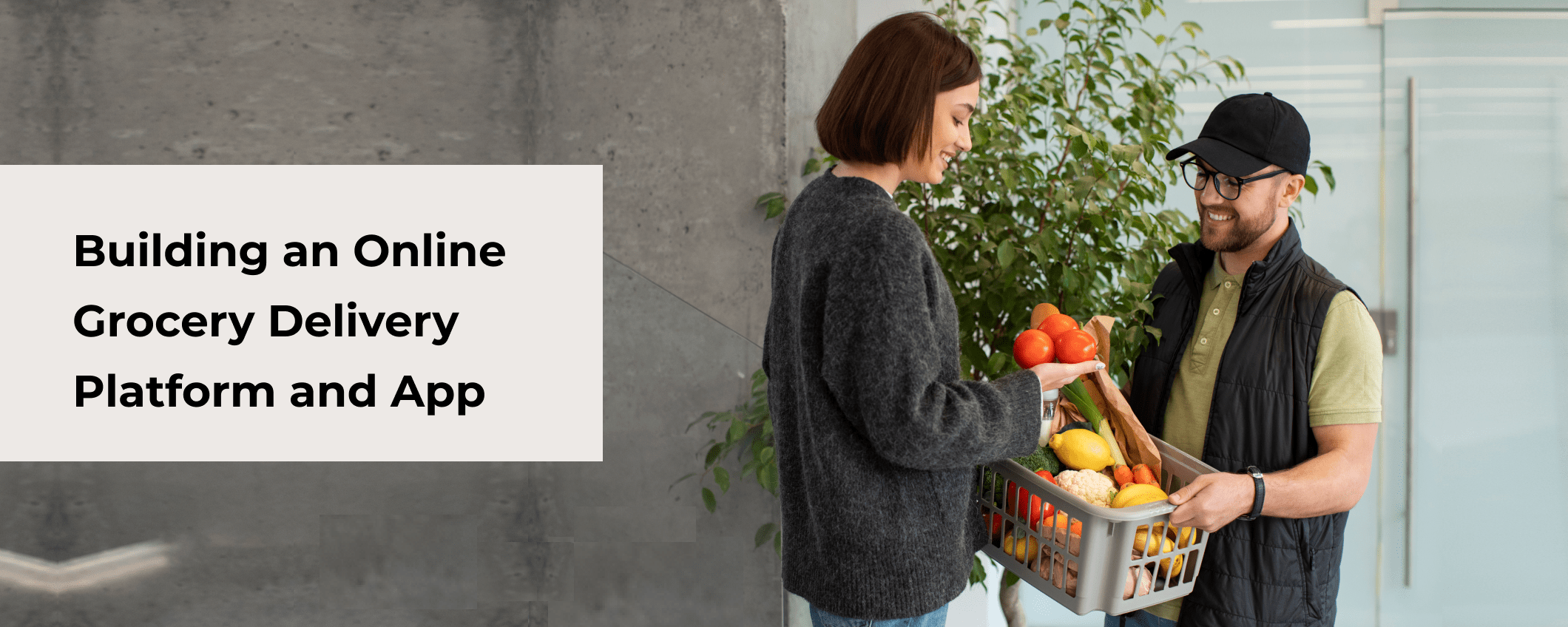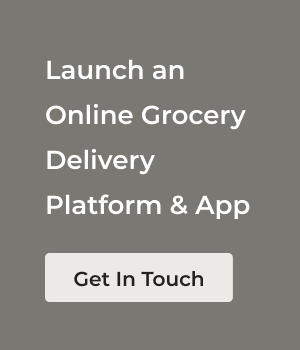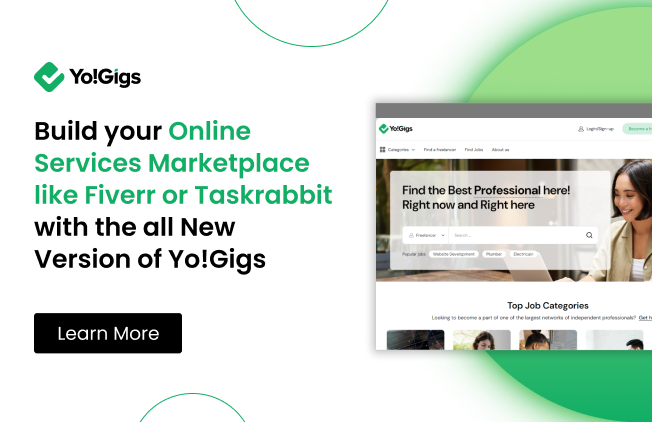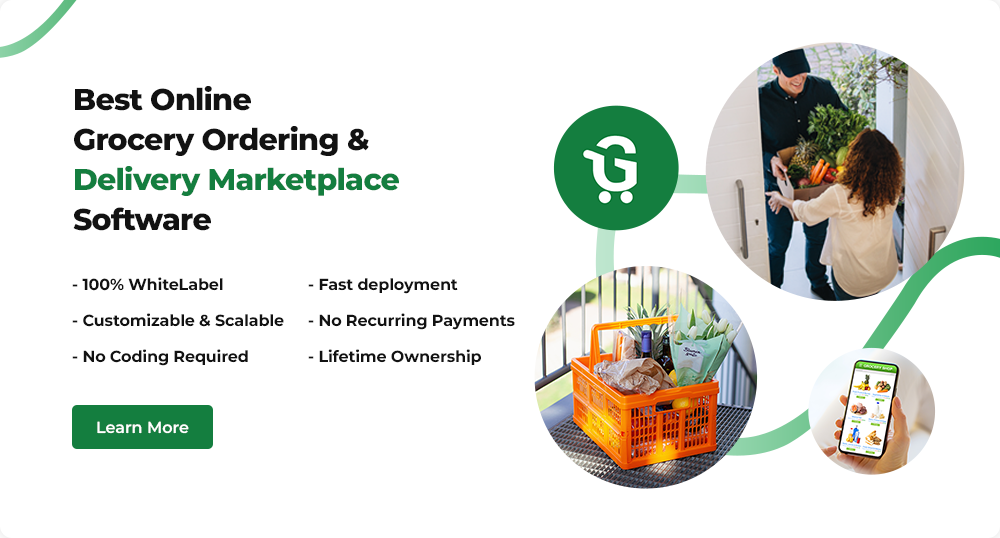Last Updated: 02 April, 2024
The online grocery industry is on a robust upward trajectory and is further poised to grow considerably in the coming years. In a recent grocery shopper survey conducted by Mercatus and Incisiv, online grocery shopping will account for 20.5% of total grocery sales by 2026 or an estimated $263 Billion whether it will be doorstep delivery or curbside pickup.
This presents a golden opportunity for entrepreneurs to capitalize. The key lies in harnessing the power of technology to build a cutting-edge online grocery delivery platform and accompanying mobile application. As it takes a lot of effort to launch a grocery delivery eCommerce platform, in this post, we look into the intricacies of building a grocery delivery platform and app – illuminating the key components that will contribute to the future success.
Table of contents
Why Must You Launch an Online Grocery Delivery Platform and App?
There are a multitude of reasons that underscore the need for entrepreneurs/grocers to venture into the grocery eCommerce space by launching their own online grocery delivery platform and accompanying application. Listed below are some of them.
The Stronghold of eCommerce
The grocery industry is on the cusp of transformation with eCommerce penetration to be more than double in the coming three to five years. According to McKinsey research, consumers will continue to showcase a positive intent to buying groceries online even after the post-pandemic era. This is because eCommerce allows consumers to compare products, avail personalized promotions, get doorstep delivery and more.
Evolving Consumer Behaviour
Technological advancements have practically broken the shackles of geographical limitations catering to people from all walks of life like younger and elder generations, urban and affluent consumers. This has brought a global disruption in the grocery industry, where new and old players are changing customer expectations and behavior across propositions as they are increasingly seeking healthier and diverse range of products, convenience of doorstep delivery and value for money.
Expanding Business Reach
Online grocery delivery platforms and applications break geographical barriers, enabling entrepreneurs/grocers to tap into a wider customer base that might otherwise not be accessible through traditional brick and mortar stores.
Easy to Start & Time Efficient
Unlike traditional brick and mortar stores, you don’t need any physical space to start an online grocery business. It is easy to start and takes less time, i.e., you just need to launch your online grocery business with an online grocery delivery solution that offers mobile apps.
Convenient for all Types of Users
An online grocery delivery platform is convenient for all users (admin, vendors, buyers). The admin can easily manage all the users, commission, go through reports and analytics for better decision making, and so on. Vendors, on the other hand, can easily list their products to reach a wider audience, keep a tab on the stock level, and more. For buyers, there is a wide range of products available, which they can buy just at the click of a button (as per convenience) and get the order delivered to their doorstep.
Building Brand Loyalty
A well architected grocery eCommerce platform and application can garner loyal customers and hence build brand loyalty with unparalleled customer support. This can lead to repeat business and can be a powerful driving force for sustainable growth in a competitive market.
Interested in Launching Your Own Online Grocery Marketplace
Top Players Delivering Value in the Grocery Delivery Industry
The grocery eCommerce competitive landscape is rapidly changing with new players springing up. However, there are some prominent players. A few of them are mentioned below:
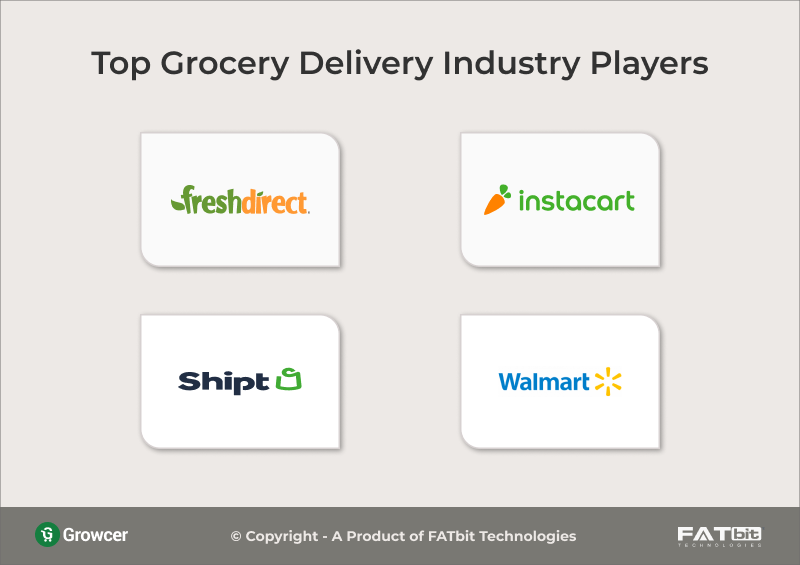
1. FreshDirect
It is an online grocery marketplace that delivers groceries to the doorstep and offers same or next day delivery. FreshDirect offers fresh and high quality grocery products with a lot of discounts to buyers, encouraging them to buy through their website.
2. Instacart
Instacart offers grocery delivery and pickup services across the United States and Canada. Instacart lets you shop from grocery stores listed on its website or app, then sends a personal shopper who picks, packs, and delivers the order to you.
3. Shipt
Founded in 2014 and owned by Target Corporation, Shipt is known to offer access to a variety of stores and product categories such as groceries, household essentials, wellness products, and more. Shipt provides personal shopping and delivery services and is functional in more than 5,000 U.S. cities.
4. Walmart
Walmart enables shoppers to order groceries online and have them delivered to their doorstep. It also offers pickup options.
Important Things to Consider While Launching an Online Grocery Delivery Platform and Mobile App
Launching an online grocery delivery platform and app requires careful planning, i.e. a holistic approach considering both business and technical aspects. Here is a detailed breakdown of things to consider while launching an online grocery delivery platform and application.
Competitor Research
The initial steps towards launching an online grocery delivery platform or application is to conduct comprehensive competitive analysis. This includes identifying your competitors, their strengths and weaknesses, their offerings, and so on. This step basically aids you to understand the market and find ways to stand apart in terms of your offerings. Competitive research can be of two types:
- Qualitative Research – Collects data that is non-numerical basically to understand customer behavior, opinion and attitudes. This can be done via conducting interviews.
- Quantitative Research – Is collection of numerical data. This is done to measure market trends and can be done via evaluating sales data, measuring website traffic, using analytics and more.
Business Model and Revenue Model
The next step is to determine the type of business model that aligns with your business vision, customer expectations and market trends. Different types of business models include:
- Inventory Based Business Model – The inventory is bought and stored by the grocery store that will provide online delivery services.
- Multi-Vendor Business Model – Multiple sellers come together to sell their grocery products on a platform.
- Hyperlocal Business Model – The delivery of grocery products is provided within a specified geographical area giving local retailers/grocers an edge to sell their grocery items.
- BOPIS Business Model – Buy Online, Pick Up In-Store or Click and Collect allows customers to purchase groceries online and pick them in store.
Once the business model is decided, it is pivotal to narrow down the revenue model as it will contribute significantly to the grocery delivery platform and app’s sustainability and financial resilience. A few of the revenue streams include:
- Commission – A common revenue stream to charge commission on every grocery delivery order or seller for each transaction through the platform.
- Delivery Fees – Charging a flat fee on delivery or depending on the order value or distance.
- Subscription – This is a recurring payment for premium services like exclusive deals, priority service or discounted deliveries.
- Advertisements – Displaying targeted advertisements within the app or the website.
Robust and Reliable Tech Stack
Choosing the right tech stack is critical as it can make a significant difference in terms of the success of your grocery eCommerce website or application. A tech stack consists of two primary components:
- Frontend Stack – This includes the technologies used to develop the user interface of the website or the application. HTML, CSS, JavaScript and so on come under this category.
- Backend Stack – On the other hand, backend acts as the backbone of the platform or the application. The frontend takes the data request and the backend executes the request through data retrieval from the server. Programming languages like PHP, Ruby, Python, Java come under this category.
- Database & Server – As the name suggests, databases store the data while servers deliver the data upon request. MongoDB (database) and Apache (server) are quite popular.
Flexible Framework
A proper framework is also needed to support programming languages and backend servers and a database to store the data. Choose a framework that can accommodate multiple niches apart from grocery such as dairy, pet food, supplements, online pharmacy and more.
Scalable and Customizable
Scalability and customization depends on the tech stack that has been chosen. Plan the platform and the application in a way that it is scalable and customizable so that the future feature additions and changes can be accommodated.
High System Performance
The platform or the application to be designed for grocery delivery needs to be responsive with quick load times and high performance, i.e. it should be capable of handling increased user loads. Thorough performance testing should be conducted to identify and resolve potential bottlenecks.
UAT and UX Testing
User Experience (UX) and User Acceptance Testing (UAT) is vital as if an online grocery delivery website or an application is released to the public without testing then it can negatively affect the brand image and may result in loss of consumers if there are bugs or usability issues. Hence, prioritizing a simple and intuitive UX/UI to enhance user satisfaction is important.
Time to Launch the Platform
This is another critical factor, ultimately the time needed to launch an eGrocery platform and an application will determine its success. If the launch is too late it will result in competitive disadvantage. Hence, there are a few factors to consider like availability of resources, regulatory environment, competitive landscape to determine the time for launch.
Budget
The budget will basically depend on the site’s and app’s complexity in terms of features and functionality, integrations, design, further marketing and so on. So, thinking about the budget beforehand would be better and wise. You can determine a realistic budget for the entire process from development to launch, ongoing maintenance and potential contingencies.
Profit by Launching an Online Grocery Delivery Platform
Essential Features to Have in an Online Grocery Delivery Platform/App
Admin Features
- Commission Management
- User Management
- Delivery Management
- Order Cancellation & Adjustment
- Product Catalog System
- Analytics and Reports
- Tax Management
- Multiple Level of Administrative Access
- Subscription Packages Management
Seller Features
- Registration
- Reports
- Pin Shop On the Map
- Bulk Import/Export
- Delivery Slots Management
- Order Cancellation Management
- Refund Order Management
Buyer Features
- Easy Sign Up
- Search Filters
- Auto-Detect the User Location
- Easy Checkout
- Real-Time Tracking & Updates
- Progressive Web Apps (PWA)
- Ratings & Reviews
Delivery Staff Features
- Define Radius
- Accept or Reject Order
- Click & Call to Sellers & Buyers
- Delivery Order Management
- Push Notifications
- Order Cancellation
- Route Navigation
How to Launch an Online Grocery Delivery Platform and App?
An online grocery delivery platform and app can be launched by following different approaches. A few of them are listed below:
- Custom Development
- Using Open Source Platforms
- Using an Off-the-Shelf Solution
Custom Development
This is a tailored approach to meet the specific needs of a business. The platform is built from scratch with custom features and functionality. The development time is longer and the cost is higher.
Using Open Source Solutions
There are certain open source solutions that are freely available to anybody, and can be modified with the help of people with technical expertise like developers. These can be cost effective solutions, but technical expertise is needed.
Using an Off-the-Shelf Solution
Choosing an off-the-shelf solution is a better approach as it is readymade and consists of industry tested features and functionality. It is cost effective and is quick to launch. You just need to buy, launch and get started.
How can Growcer Help to Launch Your Online Grocery Platform and Mobile App?
Developed by FATbit Technologies, Growcer is a readymade eGrocery solution that is designed for entrepreneurs and grocers who are looking to launch their own online grocery platform. It is a fully customizable solution that is 100% white-label. Additionally, Growcer also provides robust and intuitive mobile apps for buyers and delivery staff for both Android and iPhone users.
Furthermore, entrepreneurs can also use Growcer to build marketplaces that cater to several other niches apart from grocery. These include pharmacy, pet supplies, liquor/wine, dairy, construction materials, bakery goods and more. Moreover, Growcer also offers 1 year of free technical support and no additional cost installation.
Key Highlights of Growcer
- Ready-made eGrocery Solution
- 100% White-Label
- Fully Customizable & Scalable
- 1 Year of Free Technical Support
- Offers Buyer & Delivery Partner Apps (Android & iOS)
- Powerful Dashboards
- Reports & Analytics
- PCI Compliant for Secure Transactions
- Real-time Inventory Management
- Return & Refund Management
Growcer Powered Clients
ShopExpress
Powered by Growcer, ShopExpress is a Zimbabwe based online grocery delivery platform that provides quality grocery delivery products to the customers door. The platform is also supported by robust mobile apps for enhanced grocery delivery.
Superkiwi
A USA-based online grocery delivery platform that provides quick delivery of groceries is built using Growcer. There are several distinguishing features and integrations in the platform like CyberSource payment gateway for secure transactions, WhatsApp integration for customer support, and more.
Tap Retail
A tailor-made online grocery delivery platform that facilitates grocery delivery from local stores on the same-day within 2 hours. The platform is Ireland based and is built by customizing Growcer.
Dhalmart
A US-based grocery delivery platform that is dedicated to selling groceries, organic vegetables, and home-cooked food. Built using Growcer, the platform is equipped with several features that efficiently help with the management of delivery staff, inventory, and so on.
Use Growcer to Launch your Online Grocery Delivery Platform and App
Final Words
In today’s age where people trudge around to make ends meet, convenience and efficiency in terms of grocery delivery cannot be overshadowed. Furthermore, technology acceleration has indeed brought online grocery delivery platforms and applications to center stage. Hence, one must seize the opportunity and catch the wave of profitable growth by launching an online grocery delivery platform and accompanying application.
